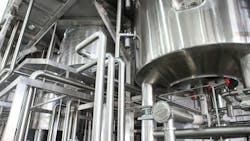Biotech’s Potential for Manufacturing Is Fermenting
The United States was a global manufacturing powerhouse. From the end of World War II into the 1970s, we were a dominant force in industrial production and manufacturing innovation. Since the late 1970s, however, U.S. manufacturing has been in decline.
In June 1979, manufacturing employment in the U.S. reached a height of 19.6 million jobs but dropped below 13 million jobs in April 2024. A similar trend exists in the U.S. industrial chemicals manufacturing industry, with jobs decreasing from over 1 million in January 1990 to less than 900,000 in April 2024. As cheaper production options became available abroad and the U.S. transitioned into a service-based economy, American manufacturers struggled to compete.
Are manufacturing and the jobs it can provide doomed in the U.S.? The answer is no.
In fact, we have a unique opportunity to leverage exciting advancements in biotech to bring back and diversify wide swaths of manufacturing production. Since the biotech revolution of the 1980s, the U.S. has led the development of innovative biotechnologies that improve our health, food and environment. Now, the U.S. can become the world leader in bioindustrial manufacturing, creating millions of jobs in the process.
Bioindustrial manufacturing uses biological systems—including microbes such as bacteria, yeast, and algae—to produce new materials or sustainable alternatives that are incorporated into products we use every day, like bio-based cement, plant-based nylon, and lab-grown cocoa.
The nearly $6 trillion global industrial chemicals industry accounts for 7% of the global GDP and upwards of 120 million jobs worldwide. As of 2022, the U.S. was the second largest chemical producing country, holding over 11% of the global market share, but we pale in comparison to China’s grip on nearly 44% of the global market share.
The U.S. has already begun to benefit from bioindustrial manufacturing, accounting for roughly $440 billion added to our bioeconomy as of 2019 and 1.65 million jobs created by the bioproduct industry as of 2017. Each additional 1% of the market share brought to the U.S. through bioindustrial manufacturing would add $60 billion to the U.S. economy. And we believe the U.S. can do even better.
To achieve this vision, we must lean into the unique advantages and characteristics of our country; evaluate our domestic strengths; and develop an innovative manufacturing ecosystem that capitalizes on what makes the U.S. special—an ecosystem that is uniquely American.
The fermentation processes typically used in bioindustrial manufacturing require feedstocks, like corn, soybeans and sugar beets. Vast regions of our country, like the Midwest, already produce these feedstocks on a massive scale. We can leverage this asset to propel a revolution in bioindustrial manufacturing that brings production back to the U.S. and creates new, well-paying jobs.
To achieve this bold vision, the U.S. must continue to invest in bioindustrial manufacturing infrastructure. Currently, the U.S. lacks the infrastructure needed for companies to bring their products quickly and successfully from the lab to commercial production. We need pilot facilities where companies can test and refine their production processes before moving into larger-scale facilities. With this proof of concept, companies can crowd-in the private capital necessary to create products for consumers in commercial-scale factories, revitalizing technical and agricultural opportunities in regions that have not previously benefited from the industrial-chemicals economy.
Thanks to Congressional leadership, BioMADE has taken the first steps to address the shortage of pilot facilities, announcing last year that its first pilot facility will be sited in Minnesota and recently shortlisting six potential states – California, Georgia, Hawaii, Indiana, Iowa, and North Carolina – for consideration as potential sites.
Our vision for America’s manufacturing future features regionally focused bioindustrial manufacturing ecosystems working together to create a powerful nationwide network. It starts with one scale-up facility; once a state has this bioindustrial manufacturing backbone, companies will follow, making use of these facilities and having an incentive to build commercial-scale factories nearby. As pilot facilities and commercial plants multiply, a regional supply chain develops – from R&D to final product – that is integrated with national and global markets.
Distributed production brings incredible benefits that leverage unique American strengths. Since biomanufacturing is poised to allow states to use regionally specific agricultural feedstocks, establishing manufacturing ecosystems throughout the country greatly reduces transportation costs and creates new, streamlined markets for farmers.
Currently, commodity chemical production in the U.S. relies on large, petroleum-based facilities localized primarily along the coasts, forcing high-polluting, crude-oil products to be transported nationwide for use in factories. Distributed production builds needed resilience into our supply chains, cutting expensive, energy-intensive transportation and furthering our industrial decarbonization goals while making use of crops grown in our own backyard. By optimizing these supply chains, we can make the future of American manufacturing not only more cost-effective but better for the environment, reopening the doors of shuttered factories across the U.S. for hardworking Americans.
Bioindustrial manufacturing provides an opportunity to rein in a new golden age of American manufacturing. There is a future where American stores are stocked full of products stamped with a “Made in the USA” sticker. The choices we make today will shape our bioeconomy for decades to come. Together, we can rebuild American manufacturing and establish the U.S. as the global bioindustrial leader.
About the Author

Douglas Friedman
Doug Friedman is CEO of BioMADE, where he seeks to secure the growth of the U.S. industrial biomanufacturing ecosystem and advance the non-health bioeconomy. He also serves as consultant (SGE) at the White House Office of Science & Technology Policy and on an advisory committee for the U.S. Department of Commerce.
